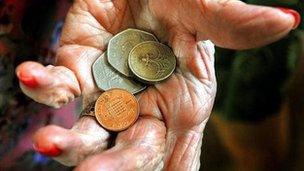Labour fail to block 'granny tax' in House of Commons
- Published

Labour have lost a Commons vote seeking to halt plans to freeze age-related tax allowances for pensioners.
Many over-65s can currently earn more before tax than working-age people.
The government wants to end that, but says it is making older people better off overall by raising the basic state pension by more than 5%.
But shadow chancellor Ed Balls says the so-called "granny tax" could leave some pensioners on relatively modest incomes up to £323 a year worse off.
MPs voted by 298 to 231 against Labour's proposal to drop the plan. The 67-vote defeat is latest in a series of losses in votes forced by Labour on Budget measures.
On Wednesday, the party tried to block both the "pasty tax" - a plan to change VAT arrangements on hot takeaway food - and the cut in the 50p top rate of income tax.
It lost both votes, by 35 and 67 votes respectively.
In a third vote, over the imposition of VAT on static caravans, 17 Conservatives rebelled and the government's majority was cut by more than two-thirds to just 25.
'Botched'
At present, people of working age can earn £8,105 a year before paying income tax - a figure which is set to rise next year.
Pensioners earning less than than about £24,000 a year get a more generous tax-free allowance - £10,500 for 65-74 year olds and £10,660 for those aged 75 and over. That advantage gradually tapers off as income rises to about £29,000.
From next year, the government plans to freeze those allowances for anyone already aged 65, and scrap them altogether for anyone who turns 65 after 5 April, 2013.
Nearly four and a half million people will be affected - some 40% of pensioners - losing an average of £83 each, but the government says the move will save £1bn by 2015.
There will be no change for those earning more than £30,000 - who would not have received the extra allowance anyway - or those receiving only the basic state pension and pension credit, who do not earn enough to pay income tax.
During Thursday afternoon's Finance Bill debate, Exchequer Secretary to the Treasury David Gauke defended the tax changes, arguing that the basic state pension had gone up by £127 more under the coalition government than it would have done under plans inherited from Labour.
But for Labour, shadow chief secretary to the Treasury Rachel Reeves said ministers could not take credit for an increase in pensions forced on them by the high rate of inflation.
And she added: "We should be doing what we can to help them, not seeing pensioners as a soft target for stealth taxes - as this chancellor clearly does."
Conservative MP Richard Harrington asked Ms Reeves whether she believed "as a point of principle" that people under 65 should have a lower personal allowance than those over that age.
She replied that retired people were under "more pressure" because they relied on fixed incomes.
Branding the policy a "disreputable raid on the incomes of older people", she said the Commons vote was an opportunity for Conservative and Lib Dem MPs "to make amends".
'Tax on prudence'
Many pensioners groups have criticised the move.
Geraldine Bedell, editor of the website Gransnet, told the BBC: "What people are saying on our forums is that they feel that they're a soft target, that this is a tax on prudence.
"These are people who've saved all their lives and expected to have a certain income, a very modest income, and their expectations are being cut from underneath them."
But Mervyn Kohler, from Age UK, said that while some people would be affected, the change was "relatively small beer in the big picture of things".
"By definition, they are the people who will have got better incomes, because they have savings and investments and things like that that they can rely on."
Angus Hanton, from think tank the Intergenerational Foundation, said the government was not going far enough.
"We wonder why people over 65 don't have to pay National Insurance on earned income. That seems to us to give them an unfair advantage in the labour market," he said.
- Published14 March 2013
- Published22 March 2012